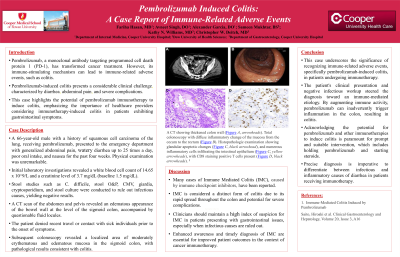Sunday Poster Session
Category: Colon
P0311 - Pembrolizumab-Induced Colitis: A Case Report of Immune-Related Adverse Events
Sunday, October 27, 2024
3:30 PM - 7:00 PM ET
Location: Exhibit Hall E

Has Audio

Fariha Hasan, MD
Cooper University Hospital
Philadelphia, PA
Presenting Author(s)
Fariha Hasan, MD1, Avneet Singh, DO2, Alexander Garcia, DO2, Sameen Mukhtar, MBBS3, Kathy N. Williams, MD, MS1, Christopher Deitch, MD4
1Cooper University Hospital, Philadelphia, PA; 2Cooper University Hospital, Camden, NJ; 3Dow Medical College, Karachi, Sindh, Pakistan; 4Cooper Health Gastroenterology, Camden, NJ
Introduction: Pembrolizumab, a monoclonal antibody targeting programmed cell death protein 1 (PD-1), has significantly transformed cancer treatment. However, its immune-stimulating mechanism can lead to immune-related adverse events, such as colitis. Pembrolizumab-induced colitis presents a considerable clinical challenge, characterized by diarrhea, abdominal pain, and severe complications. This case underscores the potential of pembrolizumab immunotherapy to induce colitis, emphasizing the importance of healthcare providers considering immunotherapy-induced colitis in patients exhibiting gastrointestinal symptoms.
Case Description/Methods: A 66-year-old male with a history of squamous cell carcinoma of the lung, receiving pembrolizumab, presented to the emergency department with generalized abdominal pain, watery diarrhea up to 25 times a day, poor oral intake, and nausea for the past four weeks. Physical examination was unremarkable. Initial laboratory investigations revealed a white blood cell count of 14.65 x 10^9/L and a creatinine level of 3.7 mg/dL (baseline 1.5 mg/dL). Stool studies such as C. difficile, stool O&P, CMV, giardia, cryptosporidium, and stool culture were conducted to rule out infectious causes, yielding negative results. A CT scan of the abdomen and pelvis revealed an edematous appearance of the bowel wall at the level of the sigmoid colon, accompanied by questionable fluid locules. The patient denied recent travel or contact with sick individuals prior to the onset of symptoms. Subsequent colonoscopy revealed a localized area of moderately erythematous and edematous mucosa in the sigmoid colon, with pathological results consistent with colitis.
Discussion: This case underscores the significance of recognizing immune-related adverse events, specifically pembrolizumab-induced colitis, in patients undergoing immunotherapy. The patient's clinical presentation and negative infectious workup steered the diagnosis toward an immune-mediated etiology. By augmenting immune activity, pembrolizumab can inadvertently trigger inflammation in the colon, resulting in colitis. Acknowledging the potential for pembrolizumab and other immunotherapies to induce colitis is paramount for prompt and suitable intervention, which includes holding pembrolizumab and starting steroids. Precise diagnosis is imperative for effective treatment, underscoring the necessity to differentiate between infectious and inflammatory causes of diarrhea in patients receiving immunotherapy.
Disclosures:
Fariha Hasan, MD1, Avneet Singh, DO2, Alexander Garcia, DO2, Sameen Mukhtar, MBBS3, Kathy N. Williams, MD, MS1, Christopher Deitch, MD4. P0311 - Pembrolizumab-Induced Colitis: A Case Report of Immune-Related Adverse Events, ACG 2024 Annual Scientific Meeting Abstracts. Philadelphia, PA: American College of Gastroenterology.
1Cooper University Hospital, Philadelphia, PA; 2Cooper University Hospital, Camden, NJ; 3Dow Medical College, Karachi, Sindh, Pakistan; 4Cooper Health Gastroenterology, Camden, NJ
Introduction: Pembrolizumab, a monoclonal antibody targeting programmed cell death protein 1 (PD-1), has significantly transformed cancer treatment. However, its immune-stimulating mechanism can lead to immune-related adverse events, such as colitis. Pembrolizumab-induced colitis presents a considerable clinical challenge, characterized by diarrhea, abdominal pain, and severe complications. This case underscores the potential of pembrolizumab immunotherapy to induce colitis, emphasizing the importance of healthcare providers considering immunotherapy-induced colitis in patients exhibiting gastrointestinal symptoms.
Case Description/Methods: A 66-year-old male with a history of squamous cell carcinoma of the lung, receiving pembrolizumab, presented to the emergency department with generalized abdominal pain, watery diarrhea up to 25 times a day, poor oral intake, and nausea for the past four weeks. Physical examination was unremarkable. Initial laboratory investigations revealed a white blood cell count of 14.65 x 10^9/L and a creatinine level of 3.7 mg/dL (baseline 1.5 mg/dL). Stool studies such as C. difficile, stool O&P, CMV, giardia, cryptosporidium, and stool culture were conducted to rule out infectious causes, yielding negative results. A CT scan of the abdomen and pelvis revealed an edematous appearance of the bowel wall at the level of the sigmoid colon, accompanied by questionable fluid locules. The patient denied recent travel or contact with sick individuals prior to the onset of symptoms. Subsequent colonoscopy revealed a localized area of moderately erythematous and edematous mucosa in the sigmoid colon, with pathological results consistent with colitis.
Discussion: This case underscores the significance of recognizing immune-related adverse events, specifically pembrolizumab-induced colitis, in patients undergoing immunotherapy. The patient's clinical presentation and negative infectious workup steered the diagnosis toward an immune-mediated etiology. By augmenting immune activity, pembrolizumab can inadvertently trigger inflammation in the colon, resulting in colitis. Acknowledging the potential for pembrolizumab and other immunotherapies to induce colitis is paramount for prompt and suitable intervention, which includes holding pembrolizumab and starting steroids. Precise diagnosis is imperative for effective treatment, underscoring the necessity to differentiate between infectious and inflammatory causes of diarrhea in patients receiving immunotherapy.
Disclosures:
Fariha Hasan indicated no relevant financial relationships.
Avneet Singh indicated no relevant financial relationships.
Alexander Garcia indicated no relevant financial relationships.
Sameen Mukhtar indicated no relevant financial relationships.
Kathy Williams indicated no relevant financial relationships.
Christopher Deitch indicated no relevant financial relationships.
Fariha Hasan, MD1, Avneet Singh, DO2, Alexander Garcia, DO2, Sameen Mukhtar, MBBS3, Kathy N. Williams, MD, MS1, Christopher Deitch, MD4. P0311 - Pembrolizumab-Induced Colitis: A Case Report of Immune-Related Adverse Events, ACG 2024 Annual Scientific Meeting Abstracts. Philadelphia, PA: American College of Gastroenterology.
